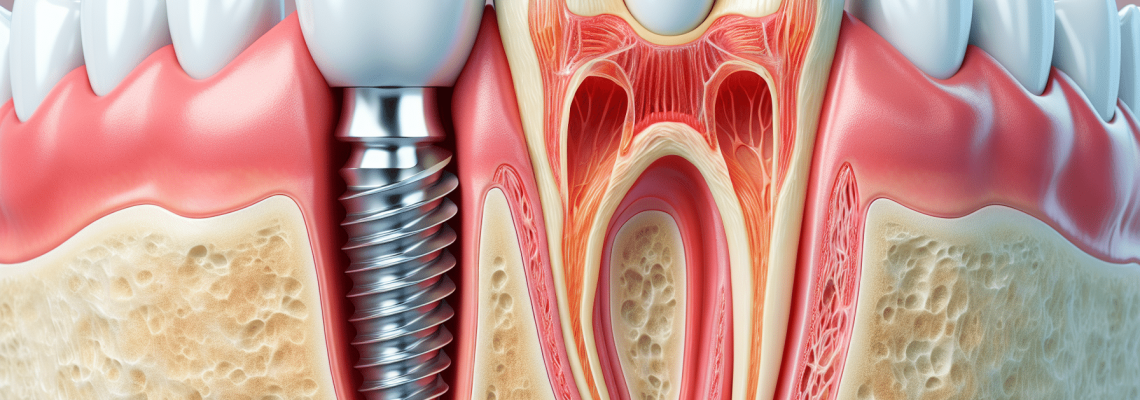
All-on-4 dental implants have redefined the landscape of restorative dentistry, providing a reliable solution for those who have lost most or all of their teeth.
This innovative dental treatment offers a durable and secure alternative to conventional dentures, empowering individuals to enjoy improved oral functionality in daily activities such as eating, speaking, and smiling.
This article will cover the essentials of all-on-4 dental implants, from understanding the procedure and its numerous benefits to navigating the recovery journey to help you make an informed decision about your oral health.
What are All-on-4 Dental Implants?
All-on-4 dental implants are an innovative method of full-arch restoration in the mouth. Four dental implants are strategically placed in the jaw to support a complete set of replacement teeth. This is done to maximise the existing bone structure and can often eliminate the need for bone grafting.
The placement of the implants is meticulously planned, with the posterior implants angled to improve anchorage and stability. This angular placement not only provides strong support but also enables the immediate loading of functional replacement teeth, allowing individuals to regain the use of their teeth quickly.
Benefits of All-on-4 Dental Implants
All-on-4 implants offer numerous benefits, including:
All-on-4 implants facilitate immediate usage of the new replacement teeth. Individuals may resume normal activities, such as eating and speaking, and experience an improvement in their oral function right after the procedure.
2. Bone Preservation
The placement of implants stimulates the jawbone, which may prevent the bone loss that often occurs with missing teeth. This helps maintain facial structure and prevents the “sunken” appearance associated with tooth loss.
3. Stability and Comfort
All-on-4 implants are fixed in place, providing a stable dental solution that does not shift or move. They allow individuals to eat, speak, and smile without issues of slipping or discomfort.
4. Cost-Effective Solution
Compared to placing individual implants for each missing tooth, all-on-4 dental implants are often more cost-effective. The reduced number of implants and potential avoidance of bone grafting in many cases can contribute to overall savings.
5. Durability and Longevity
All-on-4 implants are designed to and can be a long-lasting solution with proper care. This durability makes them a reliable option for individuals seeking permanent restoration of their teeth, making them a long-term investment in oral health and quality of life.
All-on-4 Dental Implant Procedure
The All-on-4 procedure consists of several key stages. Here is a breakdown of the process:
The initial procedure begins with a thorough examination, including X-rays and 3D imaging, to assess bone density and structure. This information helps the dental team create a customised treatment plan tailored to the patient’s needs.
2. Implant Placement
On the day of surgery, individuals will usually be sedated for comfort. The dentist will place four titanium implants into the jawbone – two at the front and two at the back, often at an angle to maximise bone contact. This strategic placement ensures the implants are securely anchored, providing a strong foundation for the replacement teeth.
3. Immediate Loading
A temporary set of teeth will be placed into the mouth immediately after surgery, which is one of the most significant advantages of All-on-4 implants. This means individuals can leave the clinic with a functional set of teeth, avoiding the discomfort and inconvenience of being without teeth during the healing period.
4. Final Restoration
After a few months, once the implants have fully integrated with the jawbone (a process called osseointegration), the temporary replacement teeth will be replaced with a custom-made final set of teeth. These final restorations are designed to seamlessly match the patient’s natural teeth in colour and shape.
Recovery and Aftercare
Recovery from the all-on-4 dental implant procedure is typically straightforward, with a few key considerations to ensure optimal healing. Here is what to expect during the downtime process:
Following the surgery, individuals may experience some swelling, discomfort, and minor bleeding. These symptoms are usually manageable with prescribed medications and proper care. Additionally, applying ice packs may help reduce swelling.
2. Dietary Adjustments
Individuals are advised to stick to a soft diet for the first few days to avoid putting undue pressure on the new implants. Gradually, as healing progresses, they may reintroduce more solid foods.
3. Oral Hygiene
Maintaining good oral hygiene is crucial for the success of all-on-4 implants. Individuals should follow their dentist’s instructions for cleaning the implants and replacement teeth, including regular brushing and flossing. Using a water flosser may also help keep the area around the implants clean.
4. Follow-Up Visits
Regular follow-up appointments are necessary to monitor the healing process and ensure the implants are integrating properly with the bone. During these visits, the dental team will also check the fit and function of the temporary replacement teeth and make any needed adjustments.
5. Long-Term Maintenance
Just like natural teeth, all-on-4 implants require ongoing care. This includes regular dental check-ups and professional cleanings to maintain oral health and prolong the longevity of the implants.
Experience the Difference with All-on-4 Dental Implants
All-on-4 dental implants offer a comprehensive and effective solution for those suffering from significant tooth loss. The procedure’s ability to provide immediate oral function, along with its numerous benefits and relatively straightforward recovery process, makes it a popular choice for many individuals.
If you are considering all-on-4 dental implants, it is essential to consult with a qualified dentist before deciding to undertake the procedure – or any dental procedure at all. A professional consultation can help you assess if this type of treatment is suitable for you and help you make an informed decision about your oral health.